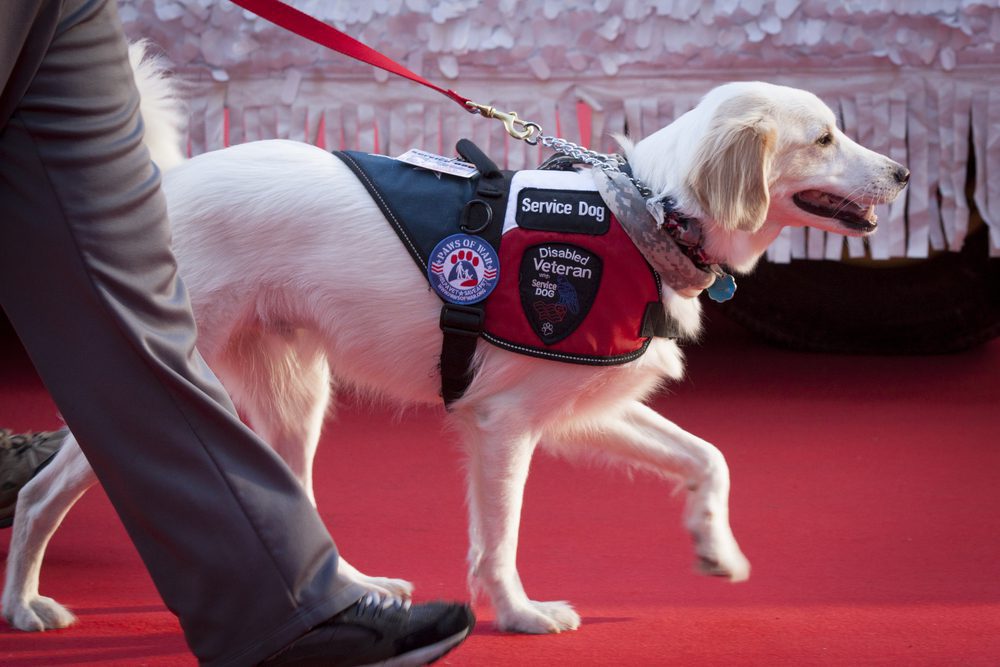Share This Article
Not only can a Psychiatric Service Dog (PSD) perform tasks to assist its handler with a disability, but these lovable companions also receive various legal protections under the Americans with Disabilities Act (ADA).
The ADA states that a person with a disability has the right to bring a service animal into any public accommodation without being treated differently or paying extra fees. Furthermore, service animals get special permission to fly inside an aircraft cabin, and the handler can’t be discriminated against in real estate or the workplace.
Nonetheless, some conditions and restrictions apply. We’ll cover all the crucial information in this in-depth service dog access guide.
What Is a Psychiatric Service Dog?
Before we examine where you can bring your PSD, it’s essential to understand what the term means.
A PSD is considered a service dog under federal law. Therefore, a PSD receives all the same legal protections as any other service dog, including those that assist people with mobility impairments and hearing loss.
The ADA classifies a service dog as an animal that is “individually trained to do work or perform tasks for people with disabilities.”
That said, there’s no requirement for the animal to be trained by a professional. Therefore, if you’ve trained your own dog to perform tasks that help you with an eligible disability, the animal is legally considered a PSD.
Keep in mind that for your dog to qualify, you must have an ADA-recognized psychiatric disability. These include (but are not limited to): anxiety disorder, bipolar, obsessive-compulsive disorder, post-traumatic stress disorder, attention-deficit/hyperactivity disorders, and depression.
Psychiatric Service Dogs, Emotional Support Animals, and Therapy Dogs: What’s the Difference?

Therapy dogs and Emotional Support Animals (ESAs) differ from PSDs, both in the tasks they perform and the legal protections they receive.
While PSDs undertake specific tasks to help people with psychiatric disabilities, ESAs provide emotional support through their presence—no training is required. Therapy dogs visit places like schools and hospitals to comfort vulnerable people.
See the following table for a quick overview of the core differences between the three.
| Psychiatric Service Dog | Emotional Support Animal | Therapy Dog | |
| Can perform disability-related tasks | YES | NO | NO |
| Has undertaken training | YES | NO | YES |
| Has been individually trained to help its handler manage a disability | YES | NO | NO |
| Can access almost all public accommodations | YES | NO | NO |
| Can travel on an airline free of charge | YES | NO | NO
|
| Is protected from a “no-pet” clause in a rental contract | YES | YES | NO |
| Can access the workplace | YES | NO | NO |
| Requires Registration | NO | NO | NO |
Note: In this article, we discuss where you can bring a PSD. ESAs and therapy dogs don’t receive most of the protections outlined below.
Psychiatric Service Dogs: Legal Protections
The ADA states that a person with an eligible psychiatric disability can bring their PSD into public accommodations (restaurants, museums, shops), transportation services (including airliners), the workplace (under certain conditions), and housing (even if there’s a “no pet” clause).
Staff at these places cannot deny entry to a person with a disability or their service dog, nor can they treat them differently or apply additional fees. These laws apply even where pets or animals normally aren’t permitted.
Most states provide similar protections to service dogs, although the definitions and details may vary. Nonetheless, a person with a disability can choose to apply whatever law grants them the most protection, either the ADA or state legislation.
Permissible Questions Under the ADA
A person with a disability cannot be asked to provide documentation to verify their disability or the animal’s training. Only two service dog-related questions are permissible under the ADA.
- Is that a service dog?
- What tasks has it been trained to perform?
A person with a disability cannot be asked to demonstrate the animal’s ability to perform these tasks.
Service Dog Apparel
There is no legal requirement to dress a PSD in service dog-related apparel, such as a vest. In addition, a public accommodation cannot request to see a certificate or ID card to verify authenticity.
However, many people with disabilities choose to dress their PSD in service dog apparel to clarify that the animal is a working service dog rather than an ordinary pet. A vest and ID card instantly communicate the animal’s status, both to staff and the general public.
It’s illegal to dress an ordinary pet in service dog-related apparel, and the penalties are severe.
Exceptions
Regardless of where you bring your PSD, some exceptions may apply. A public accommodation may refuse entry to any animal that exhibits disruptive behavior, which includes:
- Lunging
- Biting
- Attempting to bite
- Excessive growling
- Persistent barking
A public accommodation may also deny entry to a service dog it deems a safety or hygiene risk, which applies to urination and defecation. If your service dog damages public or private property through urination, defecation, or any other means, you may be liable to pay the associated costs.
Where You Can Bring a Psychiatric Service Dog

In this section, we provide more detail on the protections service dogs receive in various situations.
Public Accommodations
Public accommodations are privately or publically owned facilities that accommodate the general public.
Examples include but are not limited to:
- Hotels, campsites, motels, or any other venue where lodging is provided
- Restaurants, food stalls, bars, takeaways, or any other venue where food and drink are provided
- Terminals, airports, and stations that facilitate public transport
- Shops and retail outlets
- Entertainment complexes, including cinemas, stadiums, theatres, games arcades, bowling alleys
- Recreational areas, including parks, zoos, lakes, and sports facilities
- Public displays or collections, including museums, libraries, galleries, and exhibits
- Public gathering places, including convention centers, auditoriums, and lecture halls
- Educational institutions, including schools, colleges, and learning centers
- Social service providers, including welfare centers, food banks, and homeless shelters
The above isn’t an exhaustive list but rather an example of the most common public accommodations.
Under the ADA, private membership-based clubs and religious organizations aren’t considered public accommodations. Therefore, these venues may refuse entry to a person accompanied by a service dog.
The usual exceptions also apply: the dog must not exhibit disruptive behavior or pose a health and safety risk.
Transportation Providers
Transportation providers must allow a PSD to accompany a person with a disability on their services and cannot charge additional fees. All transportation services must abide by this law, including airlines, taxis, coaches, and trains.
However, the usual exceptions apply: the animal must not exhibit disruptive behavior or compromise the health and safety of other passengers or crew.
If booking air travel more than 48 hours in advance, the handler must fill out the Department of Transportation Service Animal Air Transportation Form and submit it to the relevant airline. If booking less than 48 hours in advance, the handler can do the requisite paperwork at the airport. A DOT Service Animal Relief Attestation Form is also required for flights over eight hours.
The Department of Transportation has other conditions the handler and animal must comply with:
- The PSD must be harnessed or leashed
- The PSD must sit by the handler’s feet, under their seat, or on their lap
- If sitting on the handler’s lap, the PSD must be no larger than a two-year-old child
- The PSD mustn’t encroach on another passenger’s space without their consent
- The PSD must be four months or older at the time of travel
- The PSD must not block the aisle
- The PSD must not eat off the tray tables
- The PSD must not occupy an exit row
- A handler may not bring more than two PSDs onboard
Housing
Under the Fair Housing Act, landlords must permit a service dog to live in a rental property if its presence affords the handler equal access to the home. If you have an eligible, ADA-recognized psychiatric disability, and your PSD performs tasks to mitigate that disability, then the animal would be covered under this law.
The law applies to residences with “no-pet” policies, and the landlord is prohibited from charging a pet deposit or any extra fees.
The Workplace
Under the ADA, an employer must make reasonable accommodations to allow a PSD to accompany its handler in the workplace. However, this only applies if the PSD performs specific tasks to help the employee fulfill their role. If a PSD isn’t required in the workplace, the employer isn’t obligated to grant the animal entry.
In addition, an employer cannot fire or refuse to hire a person due to their disability or service animal.
However, if accommodating a service animal causes “undue hardship” to the organization, the employer can refuse entry. Undue hardship can be considered either financial or operational:
- Financial:e., the PSD would require constructing new facilities at a high cost
- Operational:e., the PSD gets in the way of workers in a hospital, resulting in a significant negative impact on day-to-day operations
The ADA only provides these protections when bringing a service dog to a business with 15 or more employees. Therefore, companies with fewer than 15 staff are not required to accommodate a service dog.
Finally, an employer isn’t obliged to accommodate a service dog that exhibits disruptive behavior or poses a threat to health and safety.
Taking a Psychiatric Service Dog in Public
While various federal and state laws provide strong protections for legitimate PSDs accompanying people with ADA-recognized disabilities, the animal must be well-behaved. Any disruptive, unhygienic, or unsafe behavior will automatically revoke your right, and you may be asked to leave.
The best way to avoid this unpleasant situation is to provide your service animal with thorough training, especially public access sessions. A properly trained PSD can accompany you pretty much anywhere you go, thus greatly improving your overall quality of life.
